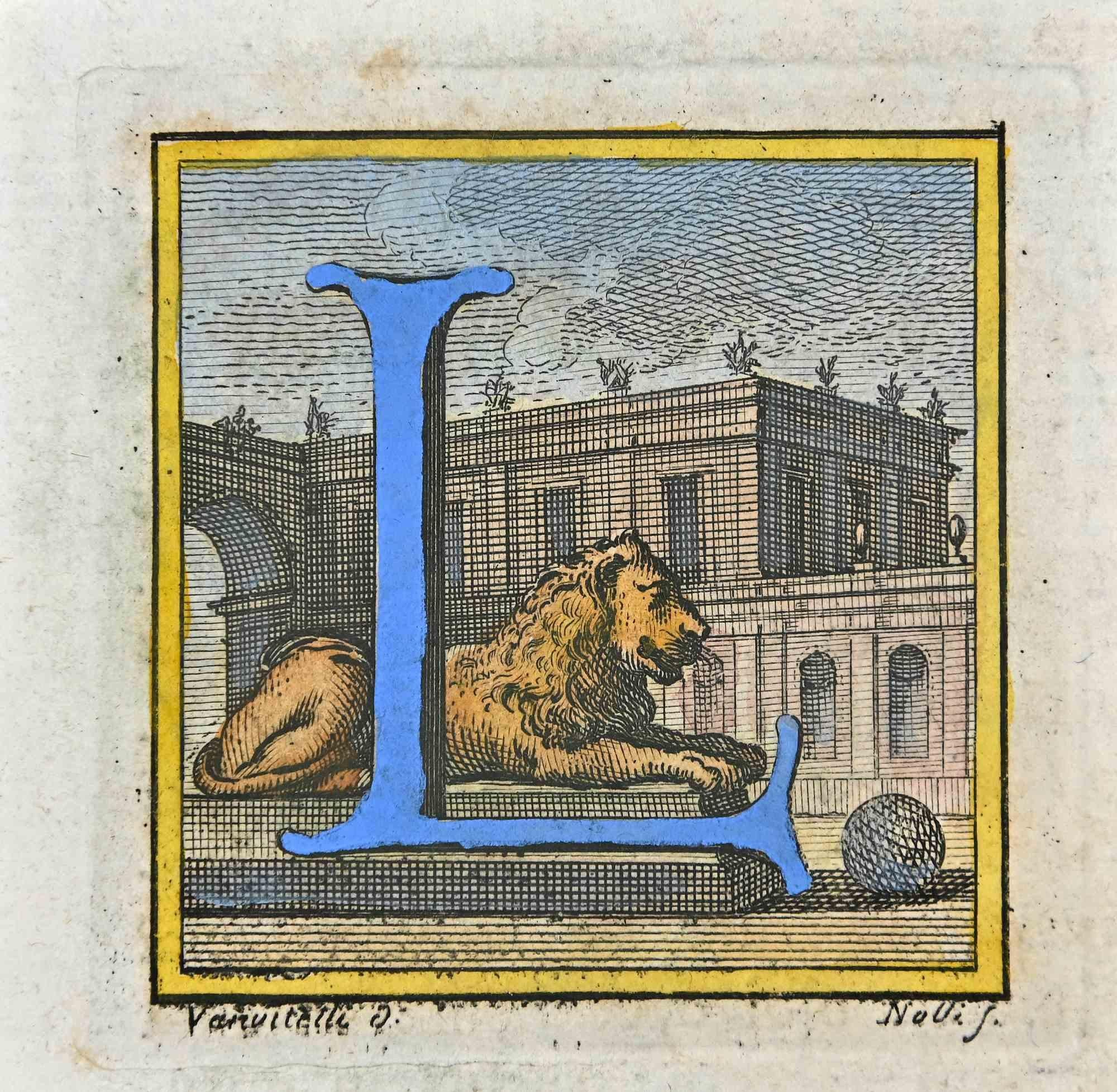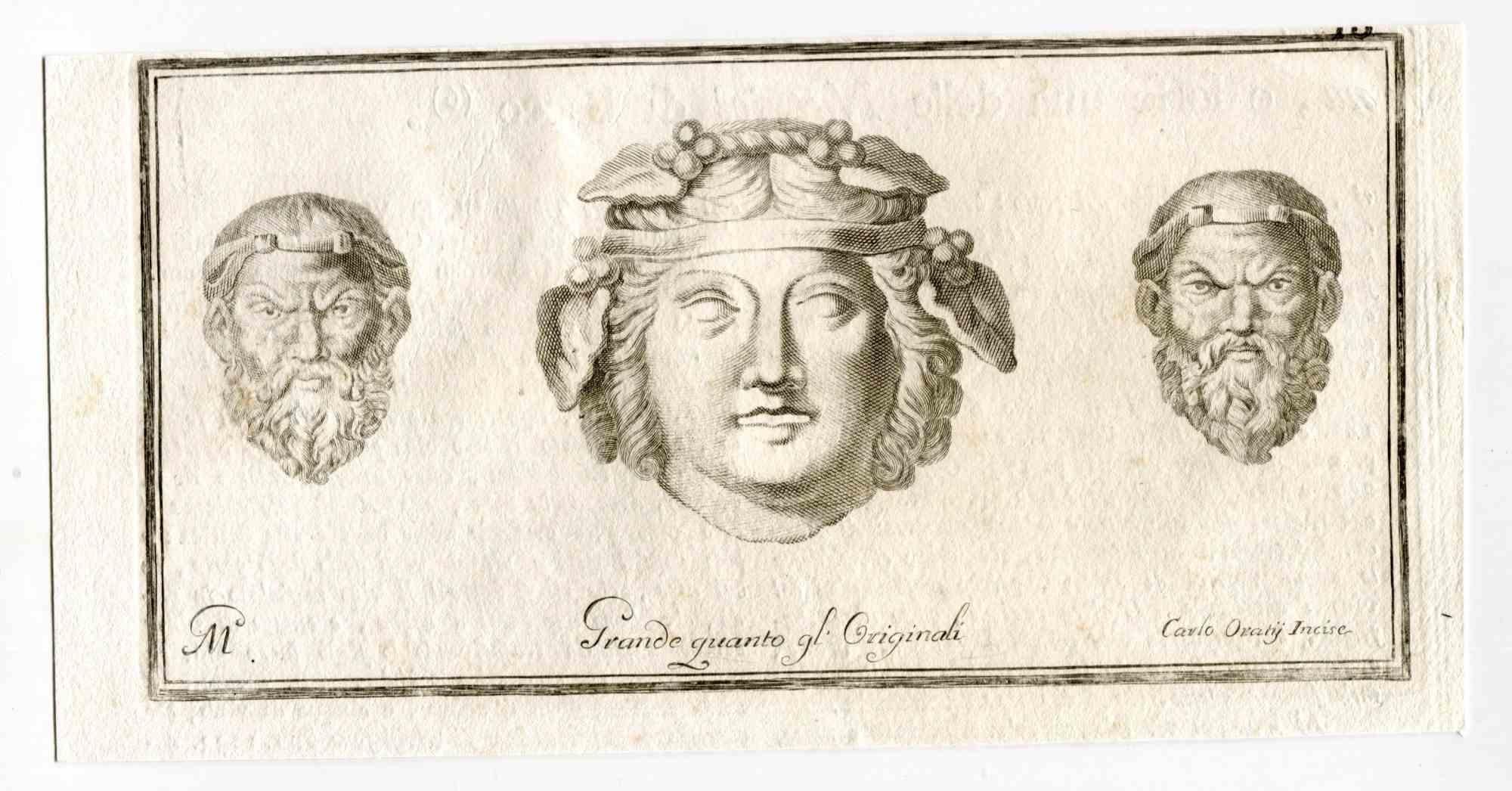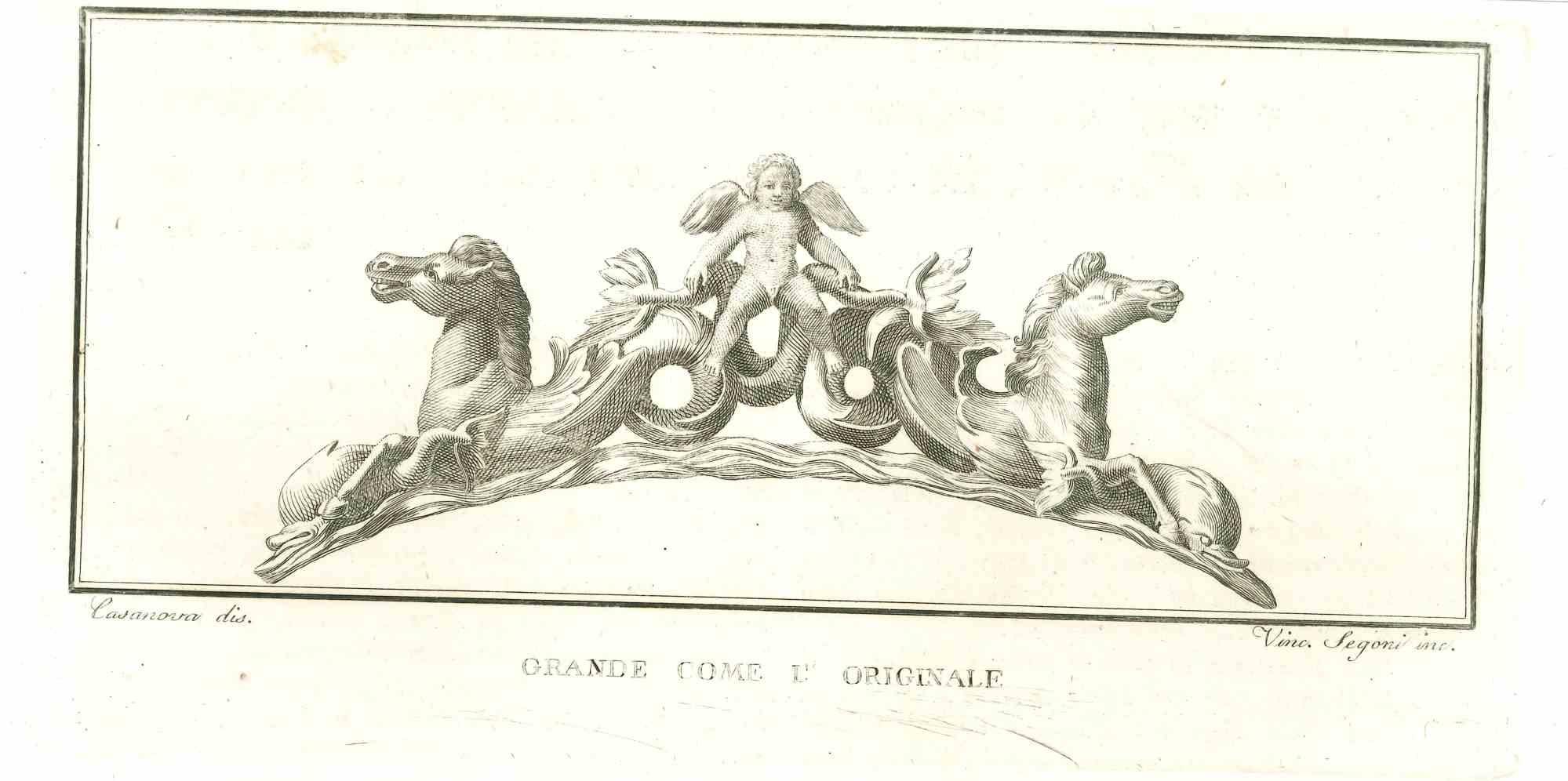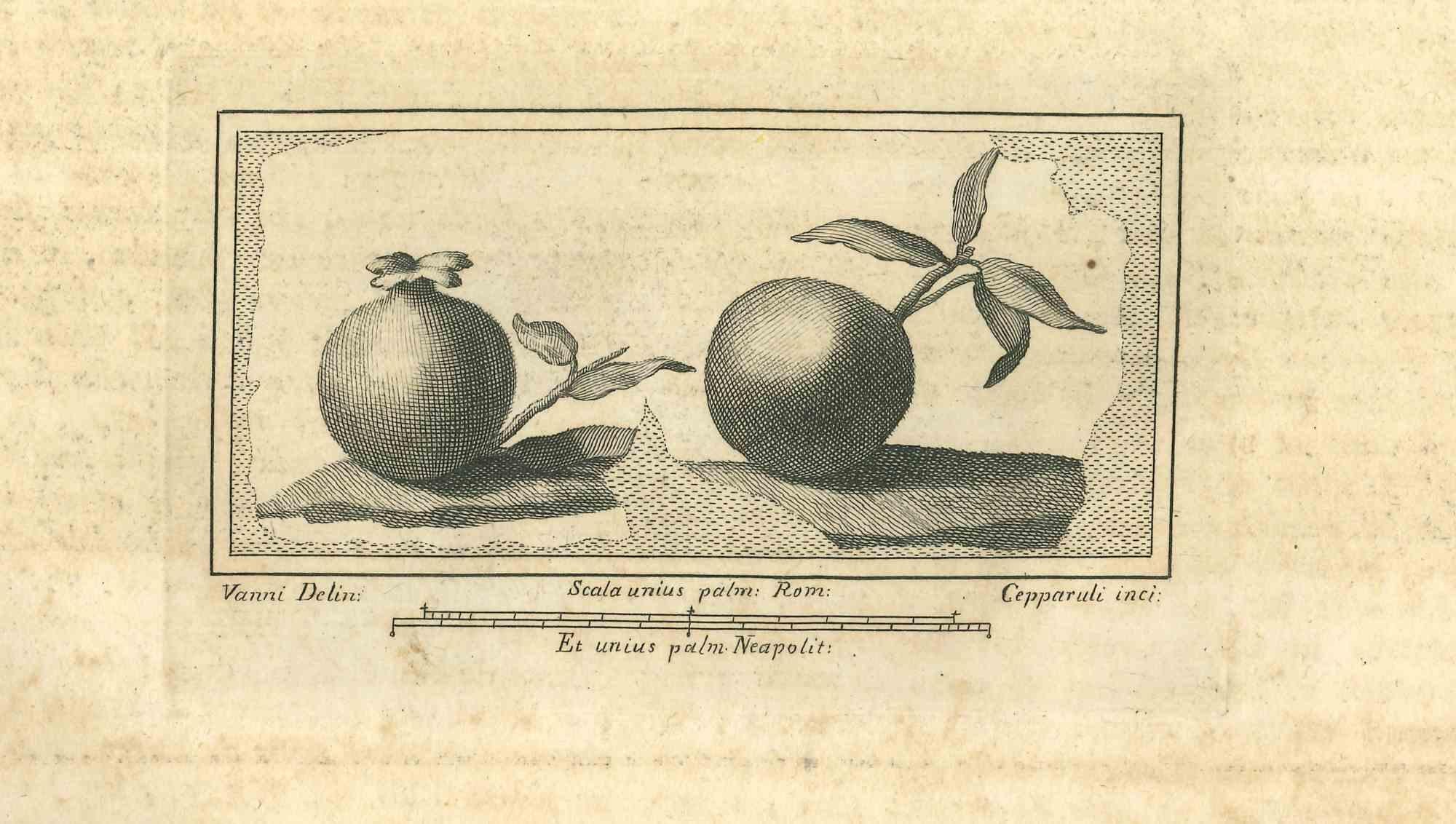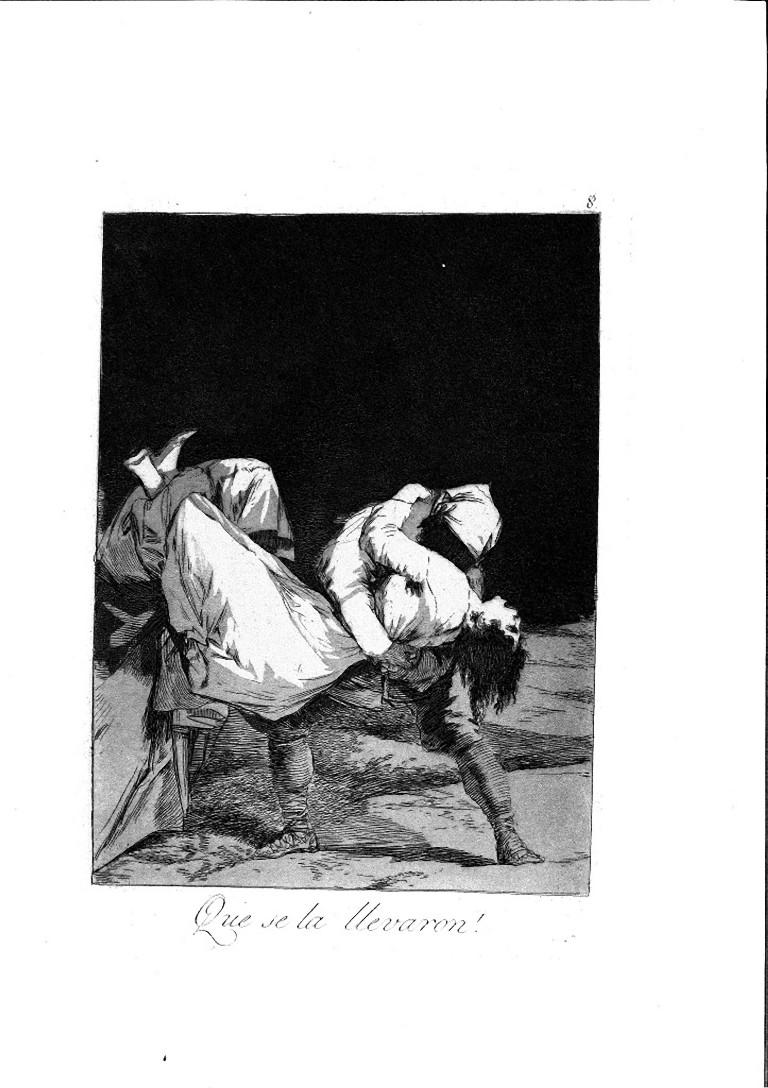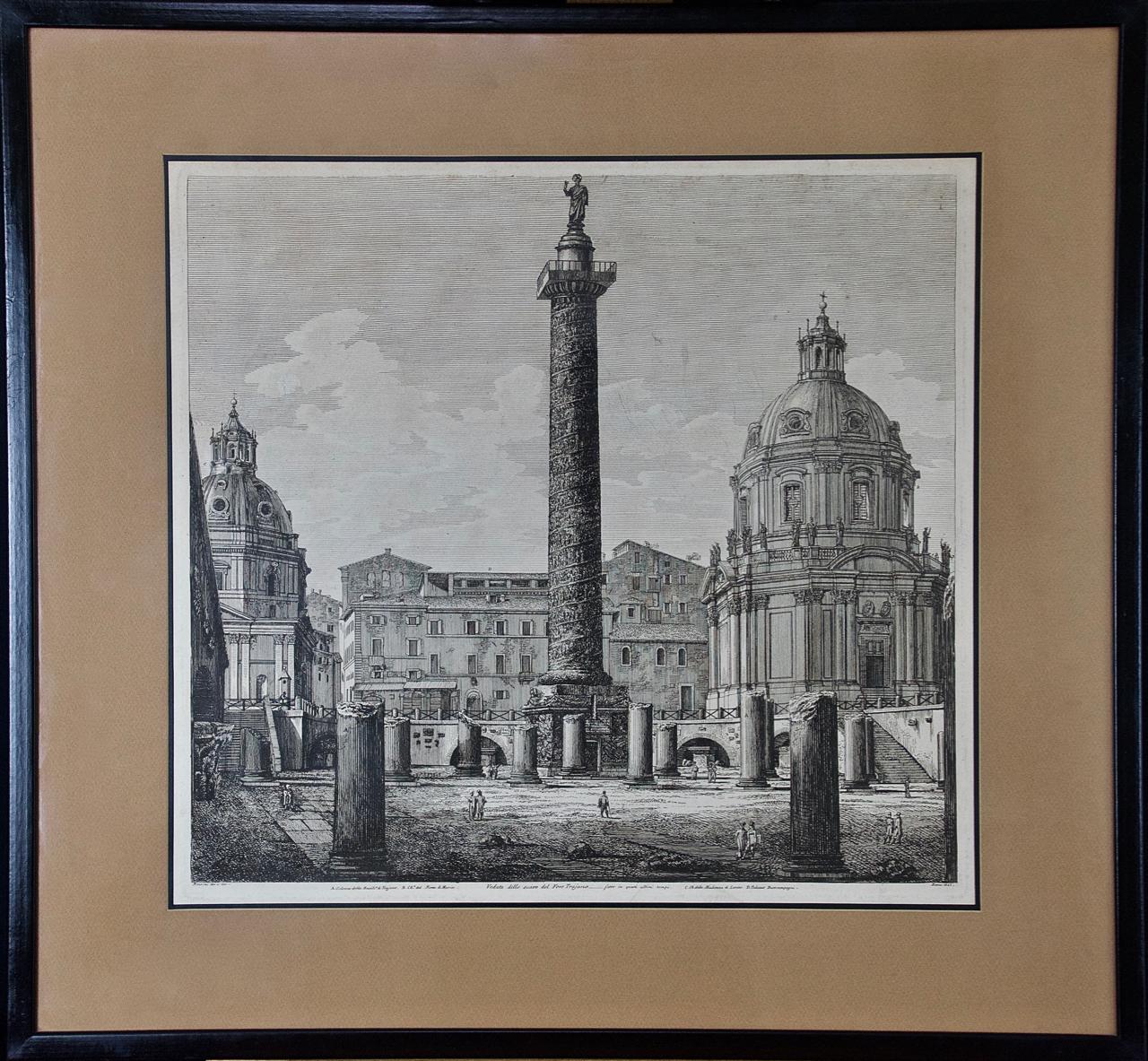Items Similar to Serpents and Roman Ceremony- Etching by Carlo Nolli - 18th Century
Want more images or videos?
Request additional images or videos from the seller
1 of 5
Carlo NolliSerpents and Roman Ceremony- Etching by Carlo Nolli - 18th Century18th Century
18th Century
About the Item
Serpents and Roman Ceremony from "Antiquities of Herculaneum" is an etching on paper realized by Carlo Nolli in the 18th Century.
Signed on the plate.
Good conditions with some foxing and folding due to the time.
The etching belongs to the print suite “Antiquities of Herculaneum Exposed” (original title: “Le Antichità di Ercolano Esposte”), an eight-volume volume of engravings of the finds from the excavation of the ruins of Herculaneum in the Kingdom of Naples (now Campania, Italy).
It was published between 1757 and 1792 by the Regia Stamperia, and copies were delivered to selected recipients across Europe.
Despite the title, the Antiquity of Herculaneum shows objects from all the excavations undertaken by the Bourbons in the Gulf of Naples. These include Pompeii, Stabia and two sites of Herculaneum: Resina and Portici.
The Bourbon King Carlo appointed fifteen scholars creating a new “Herculaneum Academy” to study the artifacts and publish the results of the archaeological excavations of the sites.
The engravings are of high quality and the accompanying text shows a large scholarship.
They were realized by 25 prominent artists involved by the King to prepare drawings and engravings on the finds, among which we can find Giovanni Elia Morghen, Carlo Nolli, Luigi Vanvitelli, and Giovanni Battista Casanova.
The “Antiquities” was designed more to amaze readers with the quality of the objects in the collection of the King of Naples than to be used in research., following and increasing the interest of 18th-century society for the classical culture and Art in particular.
Through the exaltation of the classical concept of proportions and harmony, the book was of inspiration to the neoclassical movement in Europe, giving artists and decorators access to a huge shop of Hellenistic motifs.
- Creator:
- Creation Year:18th Century
- Dimensions:Height: 14.38 in (36.5 cm)Width: 19.89 in (50.5 cm)Depth: 0.04 in (1 mm)
- Medium:
- Movement & Style:
- Period:
- Framing:Framing Options Available
- Condition:Insurance may be requested by customers as additional service, contact us for more information.
- Gallery Location:Roma, IT
- Reference Number:
About the Seller
4.9
Platinum Seller
These expertly vetted sellers are 1stDibs' most experienced sellers and are rated highest by our customers.
1stDibs seller since 2017
6,757 sales on 1stDibs
Typical response time: 2 hours
- ShippingRetrieving quote...Ships From: Grasse, France
- Return PolicyA return for this item may be initiated within 14 days of delivery.
More From This SellerView All
- Letter of the Alphabet L - Etching by Luigi Vanvitelli - 18th CenturyLocated in Roma, ITLetter of the Alphabet L from the series "Antiquities of Herculaneum", is an etching on paper realized by Luigi Vanvitelli in the 18th century. Signed on the plate. Good condition...Category
Late 18th Century Old Masters Figurative Prints
MaterialsEtching
- Ancient Roman Fresco - Original Etching by Carlo Oraty - 18th CenturyLocated in Roma, ITAncient Roman Fresco from the series "Antiquities of Herculaneum", is an original etching on paper realized by Carlo Oraty in the 18th Century. Signed on the plate. Good conditions...Category
18th Century Old Masters Figurative Prints
MaterialsEtching
- Ancient Roman Statue - Original Etching by Vincenzo Segoni - 18th CenturyLocated in Roma, ITAncient Roman Statue, from the series "Antiquities of Herculaneum", is an original etching on paper realized by Vincenzo Segoni in the 18th century.Signed on the plate on the lower r...Category
Late 18th Century Old Masters Figurative Prints
MaterialsEtching
- Antiquities of Herculaneum- Original Etching By F. Cepparuli - 18th CenturyBy Francesco CepparuliLocated in Roma, ITAntiquities of Herculaneum Exposed, original etching from the end of the 18th century, realized byFrancesco Cepparuli. Signed on the lower left on the plate Francesco Cepparuli. Go...Category
Late 18th Century Old Masters Figurative Prints
MaterialsEtching
- Que se la Llevaron! - Etching by Francisco Goya - 1799By Francisco GoyaLocated in Roma, ITQue se la Llevaron! is an original etching realized by Francisco Goya in 1799, from Los Caprichos series. The artwork is the plate 8 (as printed on plate on the higher right margin) from the series Los Caprichos, first edition. Good conditions. Los Caprichos. Put on sale the 6 February 1799, at the end of the last carnival of the century, Los Caprichos, first Goya’s printed...Category
1790s Old Masters Figurative Prints
MaterialsEtching
- Ancient Roman Statues - Etching by Vincenzo Campana - 18th CenturyBy Vincenzo CampanaLocated in Roma, ITAncient Roman Statue, from the series "Antiquities of Herculaneum", is an original etching on paper realized by Vincenzo Campana in the 18th century. Signed on the plate on the lowe...Category
18th Century Old Masters Figurative Prints
MaterialsEtching
You May Also Like
- Column of Trajan in Rome: A Framed Original 19th C. Etching by Luigi RossiniBy Luigi RossiniLocated in Alamo, CAThis early 19th century etching entitled "Veduta dello scavo del Foro Trajano" was created by Luigi Rossini and included in his publication "Le Antichita Romane" (The Rome of Antiquity), published in Rome in 1823. It depicts the historical victory column of Trajan standing amidst the rubble of broken columns that remain around it. The etching is presented in a black wood frame with a light brown outer mat and a dark brown inner mat. There are several frame abrasions. The print and mats are in very good condition. The frame measures 27" high, 29.07" wide and 0.5" deep. The print is framed and matted in the identical style as the another etching of an ancient Roman landmark, the Piazza Navona, which is also listed on 1stdibs, see item # LU117326144172. The pair would make an attractive display grouping of Roman architecture. A discount is available for purchase of the pair of prints. Luigi Rossini (1790-1857) like his predecessors, Giovanni Piranesi (1720–1778) and Giuseppi Vasi (1710-1782), was an architect and artist. Like Piranesi and Vasi, he wanted to glorify the architecture of ancient Rome, which he felt was deteriorating and needed to be documented. Several of the ruins he illustrated have, in fact, since disappeared leaving only his images as a record of their appearance. His images of the grand edifices of the city dramatically depict the power and glory...Category
1820s Old Masters Figurative Prints
MaterialsEtching
- Piazza Navona in Rome: A Framed Original 18th Century Etching by BarbaultLocated in Alamo, CAThis early 19th century etching entitled "Veduta di Piazza Navona sopra le rovine del Circo" was created by Jean Barbault (1718-1762) after a painting by...Category
Mid-18th Century Old Masters Figurative Prints
MaterialsEtching
- Cavalcade.By Marius BauerLocated in Storrs, CTA Cavalcade. 1888. Etching. Wisselingh 107. 4 5/8 x 4 (sheet 11 5/8 x 8 3/4). Edition 100, #46. A richly inked impression printed on Strasbourg cream laid paper. Printed on the ful...Category
Late 19th Century Old Masters Figurative Prints
MaterialsEtching
- 17th Century etching of travellers crossing a bridge after Antoine WaterlooLocated in Petworth, West SussexAfter Antoine Waterloo (Dutch, 1609 – 1690) Travellers crossing the bridge Etching 6.1/4 x 8.3/8 in. (15.8 x 21.2 cm.)Category
17th Century Old Masters Figurative Prints
MaterialsEtching
- "A Harlot's Progress" Plate 3 EtchingBy William HogarthLocated in Houston, TXEtching from the series titled "A Harlots Progress" by William Hogarth. The series consists of six paintings and engravings. The story is about a woman named M. Hackabout who arrived in London and started working as a prostitute. The third plate is of her getting arrest for her choice in profession. The series is a satirical story that emphasizes the dangers of being a prostitute and the health risks that come from it. In 18th century engraving, the detail of the black mole on women and men's face is a symbol of the deadly venereal disease, syphilis. In this plate, Hackabout has already contracted the disease and that is why the black dot is visible on her forehead as well as her madam's. In 1828, William Innell Clement published Harlot's Progress in columns on a single page of his newspaper Bell's Life in London #330. The detail with the cross seen in earlier reproductions of the engraving. Dimensions without Frame: H 14.5 in x W 16.5 in. Artist Biography: William Hogarth ( 10 November 1697 – 26 October 1764) was an English painter, printmaker, pictorial satirist, social critic, and editorial cartoonist. His work ranged from realistic portraiture to comic strip-like series of pictures called "modern moral subjects", perhaps best known to be his moral series A Harlot's Progress, A Rake's Progress and Marriage A...Category
1730s Old Masters Figurative Prints
MaterialsEtching
- The Column of Trajan in Rome, 19th Century Framed Etching by Luigi RossiniBy Luigi RossiniLocated in Alamo, CAEarly 19th century etching entitled "Veduta dello scavo del Foro Trajano" from Luigi Rossini's "Le Antichita Romane" (Ancient Rome), published in Rome in 1823. It depicts the historical victory column of Trajan standing amidst broken ancient Roman columns that lie around it. The column in Trajan's Forum commemorates Roman emperor Trajan's victory in the Dacian Wars. Buildings in the background represent two libraries and the Basilica Ulpia. There are people in the foreground; some walking through the square, some standing observing the scene and others in discussion. The etching is presented in a silver-colored wood frame with an off-white double mat with a black inner mat. It is in very good condition. See item # LU117324669702 for another Rossini etching...Category
1820s Old Masters Figurative Prints
MaterialsEtching
